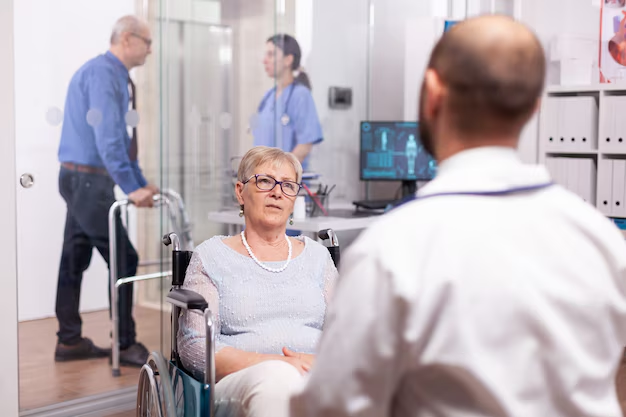Your Guide to Does Medicare Cover Urgent Care Visits
What You Get:
Free Guide
Free, helpful information about Medicare Insurance and related Does Medicare Cover Urgent Care Visits topics.
Helpful Information
Get clear and easy-to-understand details about Does Medicare Cover Urgent Care Visits topics and resources.
Personalized Offers
Answer a few optional questions to receive offers or information related to Medicare Insurance. The survey is optional and not required to access your free guide.
Is Urgent Care Covered by Medicare? Here’s What You Need to Know
When that unexpected illness or minor injury strikes, knowing whether Medicare will cover an urgent care visit can bring much-needed peace of mind. Medicare Part B, which covers outpatient services, is your go-to for urgent care visits. But let's dive deeper into the specifics so you can approach your next urgent care need with confidence.
Understanding Medicare Coverage for Urgent Care
Medicare Part B covers medically necessary services and preventive services, including urgent care visits. If you have Medicare Part B, you will typically pay 20% of the Medicare-approved amount after you meet the Part B deductible. This means you are responsible for a portion of the costs, while Medicare pays the remaining 80%.
However, it's crucial to ensure that the urgent care center you visit accepts Medicare. Most do, but a quick verification call can spare you from unexpected costs. Additionally, under Medicare Advantage (Part C), your urgent care visit will be covered, but your out-of-pocket costs may vary based on the plan's specifics.
Beyond Urgent Care: Financial and Assistance Resources
Health costs can add up, especially on a fixed income. If finding yourself struggling to cover medical costs, consider exploring other government aid programs, financial assistance options, and ways to manage or reduce medical debt.
Government Aid Programs
- Medicaid: If qualified, this state and federally-funded program can assist with additional health costs.
- State Pharmaceutical Assistance Programs (SPAP): Helps cover prescription costs for eligible residents.
- Extra Help with Medicare Prescription Drug Plan Costs: Offers financial aid to lower the price of prescription drugs.
Financial Assistance Options
- Medicare Savings Programs: Alleviate specific costs such as premiums, deductibles, and coinsurance for those eligible.
- Nonprofit and Charitable Organizations: Several organizations across the country have programs to assist with various healthcare expenses.
Debt Relief Solutions
- Credit Counseling Services: Nonprofit agencies can advise on creating a budget or managing existing debts.
- Negotiated Payment Plans: Work with healthcare providers directly to set up a manageable payment schedule.
Educational Opportunities for Better Financial Management
- Community College Financial Literacy Courses: Local community colleges often offer affordable courses on managing personal finances.
- Online Financial Planning Workshops: Many financial institutions provide free online resources or webinars.
Navigating healthcare expenses on Medicare doesn’t have to be daunting. By combining the use of your Medicare benefits with various assistance programs, you can alleviate some financial stress while maintaining good health.
Financial Assistance and Resource Overview
Here's a quick look at tools and programs that can support your financial journey:
- 🩺 Medicaid: Supplemental healthcare coverage.
- 💊 SPAP: Financial help with medications.
- 💡 Extra Help Program: Lower prescription drug costs.
- 🏥 Medicare Savings Programs: Decreases Medicare-related expenses.
- 🎗️ Nonprofit Aid: Local support from charitable organizations.
- 💳 Credit Counseling: Guidance on managing debts.
- 📝 Care Payment Plans: Tailored payment solutions with providers.
- 📚 Financial Literacy Courses: Education for smart financial choices.
- 🌐 Online Finance Workshops: Free educational resources and webinars.
Embrace these resources to ease your healthcare costs and focus on your well-being without financial stress.
What You Get:
Free Medicare Insurance Guide
Free, helpful information about Does Medicare Cover Urgent Care Visits and related resources.

Helpful Information
Get clear, easy-to-understand details about Does Medicare Cover Urgent Care Visits topics.

Optional Personalized Offers
Answer a few optional questions to see offers or information related to Medicare Insurance. Participation is not required to get your free guide.


Discover More
- Am I Elgible For Medicare
- Am I Enrolled In Medicare
- Am I Qualified For Medicare
- Are Adult Diapers Covered By Medicare
- Are Chemotherapy Drugs Covered By Medicare Part d
- Are Colonoscopies Covered By Medicare
- Are Covid Tests Covered By Medicare
- Are Cpap Machines Covered By Medicare
- Are Cpap Supplies Covered By Medicare
- Are Dental Implants Covered By Medicare
